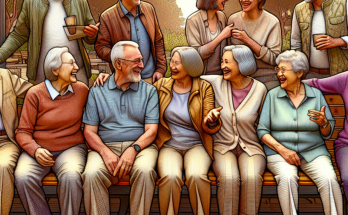Outgrowing friendships is a natural part of life. As you grow and evolve, it’s common to drift apart or recognize that your values no longer align. Though it can be difficult and bittersweet, it’s important not to feel guilty.
Growing up means changing, and it’s okay if some friendships naturally come to an end. Here’s some advice on how to gracefully let go when you’ve outgrown a friendship.
It’s natural to outgrow friendships as you enter new phases of life
- Going to different high schools or colleges often leads to growing apart
- Your interests and hobbies may change as you discover new passions
- You may develop different views on ethical issues like honesty or kindness
- Life goals can diverge, like one friend wanting to travel while another focuses on career
- Maturing at different emotional rates can strain connections
This drifting apart is nobody’s fault. It’s a natural result of becoming your own person. Don’t feel bad – it’s all part of discovering who you are.
Look for signs you may have outgrown a friendship
How do you know when you’ve outgrown a friendship and it’s time to let it fade away? Here are some subtle signs:
- You don’t look forward to seeing them as much anymore
- Your interactions feel superficial, lacking depth
- You find yourself getting annoyed or frustrated by their behavior
- You no longer share much in common or struggle to find things to talk about
- Your values and priorities seem misaligned lately
- They aren’t supportive of your other friendships or interests
- You feel like a different person around them compared to your current self
Pay attention if you notice one or more of these shifts. It likely indicates you’ve grown apart.
It’s healthy to move on when you’ve outgrown a friendship
Even if it feels sad, transitioning away from friendships you’ve outgrown is healthy and beneficial. Here’s why:
- It allows you to invest in new friendships aligned with who you are now
- It creates space for you to continue maturing and discovering yourself
- It prevents you from staying in an unsatisfying or stagnant friendship out of habit or guilt
- It lets you focus your energy on supportive friends who share your values
- It frees up time to pursue new hobbies and interests that excite you
Trust that moving on will open up new positive opportunities.
Reflect On the Positives From the Friendship
To move on gracefully, reflect on the meaningful moments, laughs, and joy this friendship brought you. Avoid dwelling on negatives or what went wrong. Instead, feel grateful for the fun times you shared and how this person impacted your life during an earlier phase. Cherish the friendship for what it was rather than regretting that it ended.
Slowly create distance
Don’t abruptly cut the person off (unless they treated you harmfully). But organically create some space by:
- Politely saying no to some invitations
- Not initiating hangouts as often yourself
- Taking more time to respond to messages
- Focusing conversations on superficial topics rather than deep sharing
This gentle distancing prevents hurt feelings and allows the friendship to fade out naturally.
Spend more time with your other friends
Lean on friendships that currently nourish you. The companionship will help fill the void left behind as you drift away from the outgrown friendship. Surround yourself with friends who share your values, interests, and outlook right now.
Be honest if asked directly
You don’t need to proactively announce the dissolution of the friendship. But if asked directly why you haven’t been around as much, be honest but kind. Say something like “It seems we’ve grown apart over time as our interests changed. I’m so grateful for the fun times we had together.”
Don’t judge their journey
As you move on, try not to judge this friend for remaining the same while you changed. Everyone matures on their own timeline. Wish them well privately even if your paths no longer align.
Expect mixed emotions
Feeling sad, wistful, guilty, or lonely as the friendship naturally fades is normal. But also look forward to new connections and this opportunity for self-discovery. Growth is often bittersweet. Experience your emotions but don’t let them hold you back.
You don’t owe anyone an explanation
Some people may want reasons why you’ve grown apart or may try to rekindle the expired friendship. You don’t owe long explanations. Simply say you’re in different places in life now and have grown in separate ways.
Reflect on what you learned
Consider what this friendship taught you about yourself, other people, relationships, and life. Even concluded friendships can provide valuable lessons if you reflect. Be grateful for what you gained.
See change as positive
Outgrowing a friend doesn’t mean the relationship failed. It means you’re evolving and maturing. That’s something to celebrate, even if it’s sad too. Change allows the next phase of your life to unfold.
Outgrowing friends is simply part of growing up. Allow yourself and others to change. Focus on the new horizons opening up as you enter this next chapter in life. Trust your gut – not old guilt or habit – as you gently move forward.
Tips for gracefully moving on from a friendship
- Cherish the good times you shared rather than dwelling on the negatives
- Create distance slowly instead of abruptly cutting them off
- Spend more time with current friends who better align with who you are now
- If asked directly, be kind but honest that you’ve grown apart
- Avoid judging them negatively for not changing as fast as you did
- Process any sadness or guilt you feel about moving on
- Look forward to new connections and opportunities for self-discovery
- You don’t owe lengthy explanations for the changes in your friendship
- Reflect on the positive lessons this friendship taught you
- Embrace the change as an exciting part of your ongoing growth and maturation
| Signs You May Have Outgrown a Friendship | Healthy Ways to Create Distance |
|---|---|
| Don’t look forward to seeing them as much | Politely say no to some invitations |
| Interactions feel superficial lately | Don’t initiate hangouts yourself as often |
| You’ve been getting annoyed by their behavior | Take more time to respond to messages |
| Your values and priorities seem misaligned | Focus conversations on superficial topics |
| You no longer share much in common | Lean on current friends who better align with who you are now |
The key is being kind to yourself and this friend. Trust that it’s normal and healthy to outgrow relationships as you enter new life stages and evolve into who you’re meant to become.




